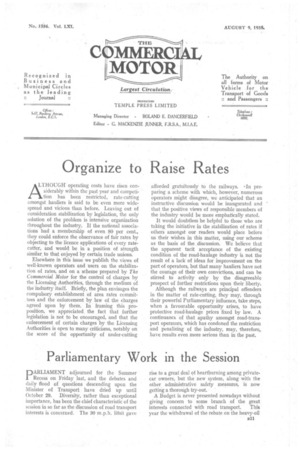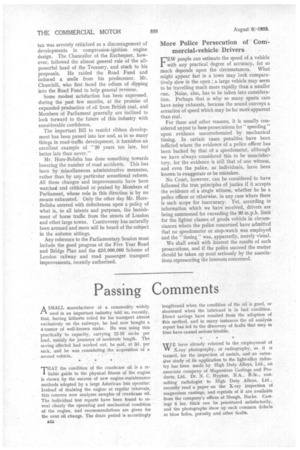Parliamentary Work in the Session
Page 17

Page 18

If you've noticed an error in this article please click here to report it so we can fix it.
DARLIAMENT adjourned for the Summer Recess on Friday last, and the debates and daily flood of questions descending upon the Minister of Transport have dried up until October 29. Diversity, rather than exceptional importance, has been the chief characteristic of the session in so far as the discussion of road transport interests is concerned. The 30 m.p.h. lifnit gave rise to a great deal of heartburning among privatecar owners, but the new system, along with the other administrative safety measures, is now getting a thorough try-out. A Budget is never presented nowadays without giving concern to some branch of the great interests connected with road transport. This year the withdrawal of the rebate on the heavy-oil tax was severely criticized as a discouragement of developments in compression-ignition engine design. The Chancellor of the Exchequer, however, followed the almost general rule of the allpowerful head of the Treasury, and stuck to his proposals. He raided the Road Fund and induced a smile from his predecessor, Mr. Churchill, who first faced the odium of dipping into the Road Fund to help general revenue.
Some modest satisfaction has been expressed, during the past few months, at the promise of expanded production of oil from British coal, and Members of Parliament generally are inclined to look forward to the future of this industry with considerable confidence.
The important Bill to restrict ribbon development has been passed into law and, as in so many things in road-traffic development, it furnishes an excellent example of "20 years too late, but better late than never."
Mr. Hore-Belisha has done something towards lowering the number of road accidents. This has been by miscellaneous administrative measures, rather than by any particular sensational reform. All these changes and improvements have been watched and criticized or praised by Members of Parliament, whose role in this direction is by no means exhausted. Only the other day Mr. HoreBelisha entered with definiteness upon a policy of what is, to all intents and purposes, the banishment of horse traffic from the streets of London and other large towns. Controversy has naturally been aroused and more will be heard of the subject in the autumn sittings.
Any reference to the Parliamentary Session must include the good progress of the Five Year Road and Bridge Plan and the £35,000,000 Scheme of London railway and road passenger transport improvements, recently authorized.
More Police Persecution of Commercial-vehicle .Drivers
TEW people can estimate the speed of a vehicle with any practical degree of accuracy, for so much depends upon the circumstances. What might appear fast in a town may look comparatively slow in the open ; a large vehicle may seem to be travelling much more rapidly than a smaller one. Noise, also, has to be taken into consideration. Perhaps that is why so many sports cars have noisy exhausts, because the sound conveys a sensation of speed which may be far more apparent than real.
For these and other reasons, it is usually considered unjust to base prosecutions for " speeding" upon evidence uncorroborated by mechanical timing. In certain cases penalties have been inflicted where the evidence of a police officer has been backed by that of a speedometer, although we have always considered this to be unsatisfactory, for the evidence is still that of one witness, and even the police, as individuals, have been known to exaggerate or be mistaken.
No Court, however, can be considered to have followed the true principles of justice if it accepts the evidence of a single witness, whether he be a police officer or otherwise, in any case where there is such scope for inaccuracy. Yet, according to information which we have received, drivers are being summoned for exceeding the 30 m.p.h. limit for the lighter classes of goods vehicle in circumstances where the police concerned have admitted that no speedometer or stopwatch was employed and the " timing " was, apparently, merely visual.
We shall await with interest the results of such prosecutions, and if the police succeed the matter should be taken up most seriously by the associations representing the interests concerned.












































































